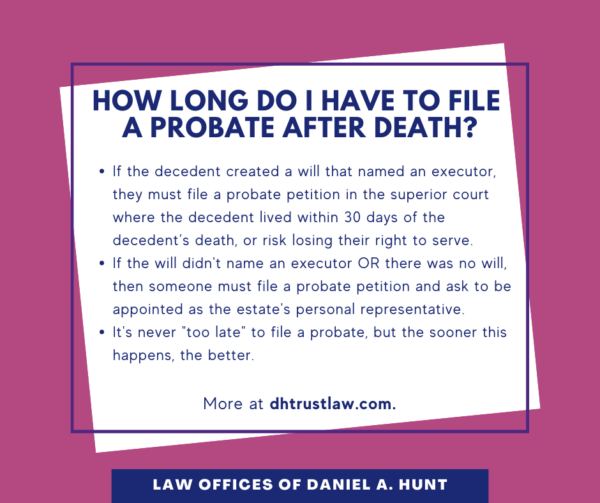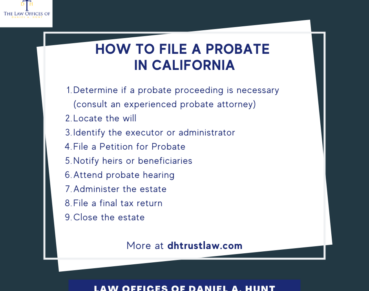How Long Do I Have to File a Probate After Death?

When a loved one dies with only a will or without any estate plan in place, their estate must pass through the California probate court before heirs can receive an inheritance. You may wonder, “How long do I have to file a probate after death?” If you need time to grieve after the death of a loved one, here’s an overview of the time limits involved in the legal process of settling a deceased person’s estate.
Filing a Probate with a Will and Executor
If the deceased person created a Last Will and Testament, the California Probate Code sets forth a deadline for the executor to file a probate. Most wills name an executor – a person who is in charge of executing the deceased person’s intentions for their estate.
The executor must file a Petition for Probate of Will and Letters Testamentary in the superior court where the decedent lived within 30 days of the decedent’s death. If they miss this deadline, they risk waiving their right to serve in that role.
The executor’s duties include:
- Working with the Court during the Probate process
- Communicating with and providing updates to estate beneficiaries
- Inventorying estate assets and seeking appraisals
- Notifying and negotiating with creditors
- Keeping an accurate accounting of the estate administration
- Distributing assets to estate beneficiaries
Filing a Probate with a Will But No Executor
If there is a will but it does not name an executor, then someone will need to file a Petition for Probate of Wills and Letters Testamentary with Will Annexed. Anyone may file the petition and ask to be appointed as the estate’s personal representative, but typically it is a family member like a spouse or adult child.
Once appointed, the personal representative carries out the same tasks as an executor, and ultimately distributes the assets to the decedent’s heirs at law.
Filing a Probate Without a Will
If the deceased person died intestate – meaning without a will or trust – then someone will need to file a Petition for Letters of Administration with the court and ask to be appointed as the estate’s personal representative.
How long do you have to file a probate after death if there was no will? There is no statute of limitations for filing a probate petition. In other words, it’s never “too late” to file a probate. But the sooner you file your petition, the better. Filing your petition quickly has several advantages:
- It starts the statute of limitations on creditor claims. The sooner you file your petition, the sooner you can set a deadline for any estate creditors to file their claims. And the sooner you resolve any outstanding creditor claims, the sooner the heirs can get their inheritance.
- It starts the statute of limitations on estate disputes. The sooner you file your petition, the sooner you can set a deadline for estate heirs to file any objections. And the sooner you resolve any disputes, the sooner the heirs can get their inheritance.
- It avoids wasting or diminishing estate assets. By filing a petition quickly, you avoid situations where estate assets decrease or sit stagnant for long periods of time. This will help maximize the inheritance each heir will receive.
Filing a Small Estate Affidavit
What if the estate is small enough to fall under the Probate threshold or only certain assets were left outside of a revocable living trust? If the gross value is under $166,250 and does not include any real property, family members can fill out a form called an Affidavit (or Declaration) for Collection or Transfer of Personal Property under Probate Code § 13100. Every person who is entitled to receive the asset must sign the affidavit and the signatures must be notarized.
If the estate consists of real property worth $55,425 or less, you can complete an Affidavit regarding Real Property of Small Value. The affidavit may be filed six months after the date of the decedent’s death in the county where the real property is located. These are two shortcuts for avoiding a full California probate proceeding on assets with a modest value.
Do I Need an Attorney to File a Probate?
Often people wonder if they need to hire an attorney to file a probate or if they can do it themselves. The court does not require you to have an attorney to file a probate. If the estate is very small and/or only has a single beneficiary, it may be possible to probate an estate on your own. However, often hiring an experienced probate attorney moves the probate process along much faster than doing it yourself.
The average California probate lasts 9-18 months but may last much longer if the matter is disputed or if the personal representative is inexperienced in probate proceedings. Probate can be very complex with many different steps and lots of paperwork to file with the court. A lawyer who has navigated hundreds or thousands of probates can efficiently guide you through this process.
If you have any questions about how long you have to file a probate, feel free to contact our law firm.
Law Offices of Daniel A. Hunt
The Law Offices of Daniel A. Hunt is a California law firm specializing in Estate Planning; Trust Administration & Litigation; Probate; and Conservatorships. We've helped over 10,000 clients find peace of mind. We serve clients throughout the greater Sacramento region and the state of California.




